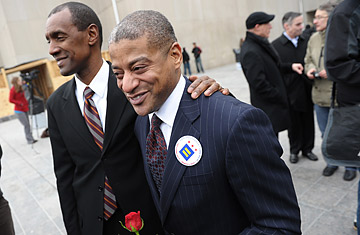
Same-sex couple Rocky Galloway, left, and Reggie Stanley celebrate after applying for a marriage license at the D.C. Superior Court in Washington
It was Culture Wars: The Musical outside the District of Columbia's Superior Court on Wednesday. On one side of the plaza, a group protesting the first day of same-sex marriage licensing in D.C. belted out familiar melodies with political lyrics, bellowing "This is the final straw with God" to the tune of "Ants Go Marching." A few yards away, a group of supporters responded with an impromptu riff on "This Little Light of Mine," drowning their opponents as they sang, "Standing on the side of love, we're gonna see them shine."
But the sing-off was as confrontational as it got that day, as change arrived with little hoopla in the nation's capital. Counterprotesters searched for protesters to counter, and both were easily outnumbered by journalists, who enveloped the newly licensed as they exited the courthouse. "Oh, it's like a dream come true," said Angelisa Young, who was the first to be licensed, with Sinjoyla Townsend. "I'm truly happy. I'm ecstatic." Young said they arrived at 6 a.m., and they were two of hundreds who arrived before noon.
Many of the applicants, hurried on by the specter of California's Proposition 8, feared that their freedom to wed could be fleeting. Brian Guse and Theran Shelton, the 23rd couple in line, got to the courthouse at 7:30 a.m. "We looked at each other and said, 'We gotta act. We gotta act while it's still available to us,' because I imagine [the legislation] will be challenged," Guse said. "Our mothers said the same thing."
The D.C. council passed the Civil Marriage Equality Act in December, joining five states in legalizing same-sex marriage, and the measure survived several attempts by religious groups to stall or counter it before going into effect on March 3. In each instance, the D.C. Human Rights Act of 1977, which prohibits discrimination on the basis of sexual orientation, proved to be the act's protector.
Still, the opposition, led by Bishop Harry R. Jackson — who made an unsuccessful last-ditch attempt to get a stay from the Supreme Court until after locals could hold a referendum on gay marriage — shows little acceptance of defeat. And D.C. councilman Marion Barry, who spearheaded the Human Rights Act before gay voters helped him become mayor in 1978, has made grim predictions based on the sentiments of his constituents. "All hell is going to break loose," he told reporters after the council voted in May 2009 to recognize same-sex marriages performed outside the District. "We may have a civil war. The black community is just adamant against this."
Many of D.C.'s same-sex-marriage supporters see the same threat and hope to keep the issue off the ballot. "If all civil rights were put up for a vote, then we would all be in big trouble," said Morgan Murphy, a heterosexual who had postponed getting her marriage license for six years while waiting for that right to be extended to homosexuals. But as she readied to join the queue of applicants with her fiancé, Todd Williamson, she concentrated on the moment. "It's time for equality," she said, "and today is the day that we start in D.C."
